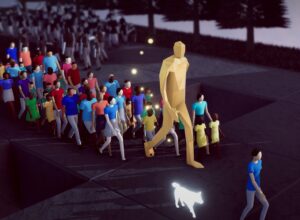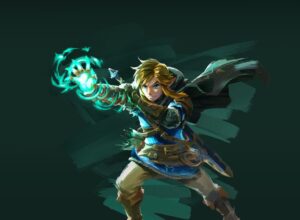Bad news for the “keep politics out of video games” crowd, but the themes of Death Stranding are inspired by the current state of global affairs.
“Keep politics out of video games,” much like the “stick to sports” edict that has all but killed Deadspin, sounds like a simple notion. On the face of it, it sounds like “please keep big issues away from my leisure activity,” which seems like a reasonable request.
But wishing for an absence of politics, by those who are catered to or reinforced by the current political climate, is actually a vote for the status quo. Even wishing for a lack of politics is inherently a political stance. (Like a government rallying against proportional representation, or suppressing votes for minorities, the young, the disenfranchised.)
One thing that has always been political, however, is the creative oeuvre of famed video game auteur, Hideo Kojima.
For some reason, certain people have it in their heads that the Metal Gear Solid series is just a silly espionage romp, with no politics behind it. It’s a story of the cold war, of secret government agencies, of battlefield ethics and the impacts of war, of terrorism and weapons of mass destruction. Hell, the final “goal” of the Metal Gear Solid series, before Kojima parted ways with Konami, was for players to voluntarily complete a global nuclear armistice, and rid the world of nukes altogether.
Which all sounds very political. And now we’ve had confirmation – from the man himself – that Death Stranding is also political in its themes.
According to reviews, which have been mixed but largely positive, the story of Death Stranding is a little bit of a jumble. In true Kojima fashion, it’s ambitious and wild and grandiose and overblown, but also, a bit baffling. Not that it’s difficult to understand per se, but it’s a flurry of acronyms and concepts and bizarre writing, that’s papered over somewhat by top-drawer acting and performance capture.
But the themes of Death Stranding are undeniable. It’s about a bloke (called Sam Porter Bridges), working for an organisation (called Bridges), run by his mother, Bridget (Bridget Bridges, presumably?), building metaphorical bridges (and often, literal bridges) across the fractured ruins of the United States of America. Building bridges is key, you might say.
In an interview with BBC Newsbeat, Hideo Kojima talked about what Death Stranding’s themes, of strands and bridges, were inspired by.
“President Trump right now is building a wall. Then you have Brexit, where the UK is trying to leave the EU, and it feels like there are lots of walls and people thinking only about themselves in the world,” Kojima says.
“In Death Stranding, we’re using bridges to represent connection – there are options to use them or break them. It’s about making people think about the meaning of connection.”
So while you can argue all you like about the presence of politics in video games – and most PR departments from big publishers like Ubisoft, EA, and Konami are keen to stress they’re not making a political statement with their games – the recently emancipated and PR-unladen Hideo Kojima would like you to know that Death Stranding’s themes of connection are in direct contrast with the current isolationism and xenophobia in western politics.
Which, whatever you make of the game itself, is really nice, actually.






